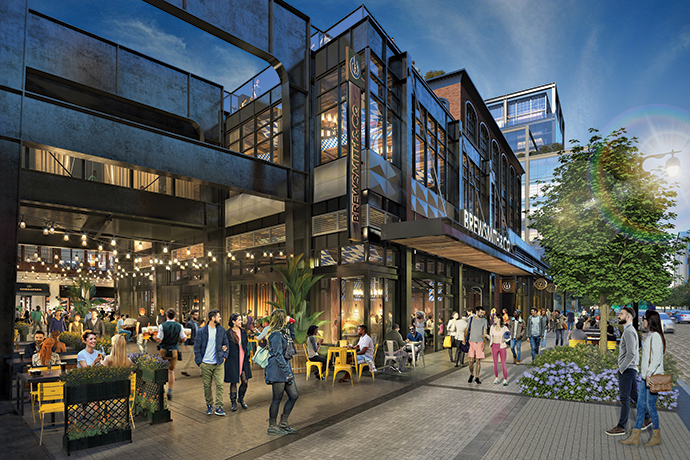Northrop Grumman opened a Cyber Center in San Antonio last year. The $100 million Georgia Cyber Center opened early this year in Augusta. Cyber skills initiatives are ramping up everywhere from Michigan Tech to Cal Poly to Carnegie Mellon. But Maryland is still the undisputed champion. And it’s trying to lap the field.
In May, Baltimore leaders held a ceremonial groundbreaking to mark the beginning of construction on the next phase of one of the largest urban renewal efforts in America — Port Covington, the $5.5 billion, 235-acre (95-hectare) redevelopment project on Baltimore City’s prime waterfront where Bethlehem Steel’s furnaces once roared.
The first buildings are set to be delivered in Fall 2021. At full build-out, the first phase will include approximately 1.38 million sq. ft. (128,200 sq. m.) of office, in addition to hotel, residential and retail space. At completion, the entire project also will include 2.5 miles (4 km.) of restored waterfront and 40 acres (16 hectares) of parks and green space.
“The Port Covington of today is a completely different place than what it was just a few short years ago, and we are just getting started,” said Marc Weller, founding partner of Weller Development Company and lead developer of Port Covington.
Port Covington will feature several key ecosystems focused on technology, life sciences and education. One of the first is focused on cybersecurity. DataTribe, a cybersecurity startup studio with offices in Maryland and Silicon Valley; AllegisCyber, one of the oldest Silicon Valley-based early-stage cybersecurity venture capital firms; and Evergreen Advisors, a Columbia, Md.-based investment banking and corporate advisory firm focused on assisting emerging growth and middle-market companies, will anchor Rye Street Market, the first area of property to be constructed.

“With Maryland’s highly talented workforce, cutting-edge research institutions, and more and more innovative companies locating here each year, no state is better equipped or better positioned to be the cyber and innovation capital of our nation,” said Maryland Governor Larry Hogan last October when the Port Covington cyber scheme was hatched.
“We are located in the midst of the country’s deepest and largest reservoir of cybersecurity engineering talent, including some of the fastest growing commercial cyber firms in the world,” said Mike Janke, co-founder of DataTribe. “Maryland is home to the world’s most advanced cybersecurity and data science coming out of the U.S. intelligence agencies, R&D labs and commercial innovation centers. Maryland has the largest cyber workforce in the world, with more than 109,000 cyber-related engineering and data science professionals. Port Covington will become home to Cyber Town USA as a leading technology hub not only for entrepreneurs and engineering talent, but also for the resources necessary for them to be successful.”
Build ‘Em Up, Move ‘Em Out
In an interview, serial entrepreneur Janke, a former Navy SEAL, says in building his previous firms, he’d moved plenty of talent out of the classified space to Silicon Valley, but he and his co-founder Bob Ackerman (founder of Allegis Capital) saw it was not sustainable, and looked or a way to move Mohammed to the mountain — i.e. the mountain of skills in Maryland and the nation’s capital region.
“The sheer volume of nation-state, trained DARPA and related talent was literally three times the rest of the country in Maryland,” he says, “but it had a nascent ecosystem. The idea was to build something different than a regular venture firm.”
Thus Data Tribe was created, ready to invest in and co-build four companies a year with $2 million a year, get them to their A round of funding, and move them out. The first one sold to Hortonworks in six months for $45 million, “so we knew that was over-resourcing it,” Janke says.
On average, he says, from 2016 to 2018, the average startup took 23 months from the time it got seed money to completing “A” series funding. “We averaged 12.4 months,” he says. “We literally cut the average in half. And three of our first nine had the highest ‘A’ round valuations in 2018. It shows the talent and innovation is here.”
Janke describes a hypothetical scenario that sounds like a video game but isn’t: “Imagine you’re working at NSA, and tasked with a team of 50 with building a product to breach the Chinese and listen in to everything. You do, and deploy it, then realize the whole world is susceptible to that. We pull them out and build a commercial version to protect against that capability.”
So far, 23% of Data Tribe’s deal flow is coming out of Silicon Valley — “an ex-DARPA teams with a Googler and wants to come back,” Janke says. “We’re shedding off four companies a year that are like rocket ships, with between $8 million and $12 million in funding. Typically in a year they go from three to 25 people, and in two years to about 68.” And you don’t find the talent out west.
“In the Valley, you don’t have nation-state-trained cyber engineers with eight years at Fort Meade [in Maryland] building up against China, Iran, North Korea and others,” he says.
“That turns out to be a critical experience component. The other side is cost. We have companies where they’re looking for a data scientist in a startup, and LinkedIn will offer them a $1.5 million signing bonus. That’s almost the entire seed round. You can’t compete there because the giant tech corporations can literally out-hire and turnover is so high, let alone rent and salaries. We’re about 58% less to build a company than in the Valley.”
Janke says while other jurisdictions pour tens of millions of dollars into branding themselves as cyber-this and cyber-that, “We don’t need to because we have all the talent in the world.” Moreover, he says, the talent that is out west isn’t afraid to make the move to Baltimore.
To stack the deck even more, the IRS just ruled that Port Covington is within an Opportunity Zone. The U.S. Cyber Command, NSA and 42 other classified technical agencies are just up the road.
In short, says Janke, “you have to screw up really bad” not to take advantage of the head start CyberTown USA has in Port Covington. And gradually a tribe beyond Data Tribe is assembling, with the goal of aggregating the largest neighborhood of commercial cybersecurity in the world.
“Right now Tel Aviv claims the largest in a business park, with 19,” Janke says. “We’re going to move in over 40 on day one.”

